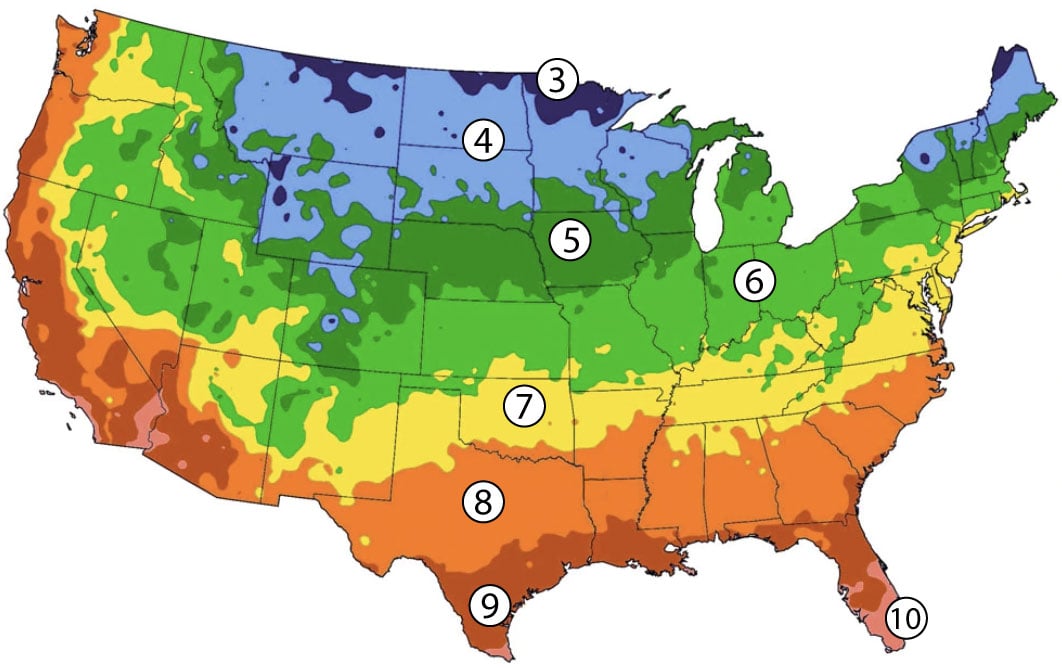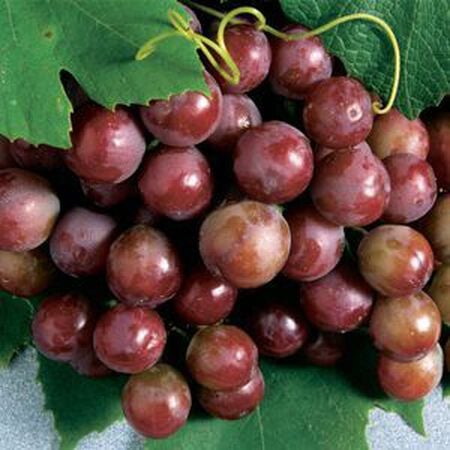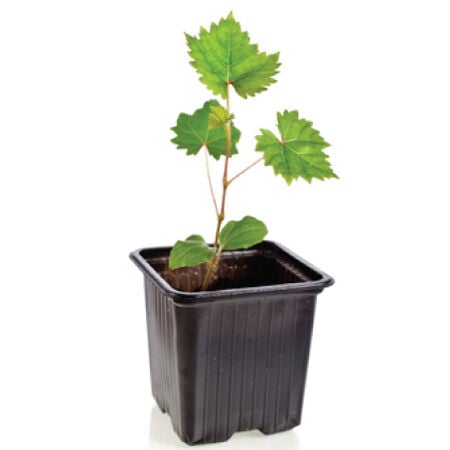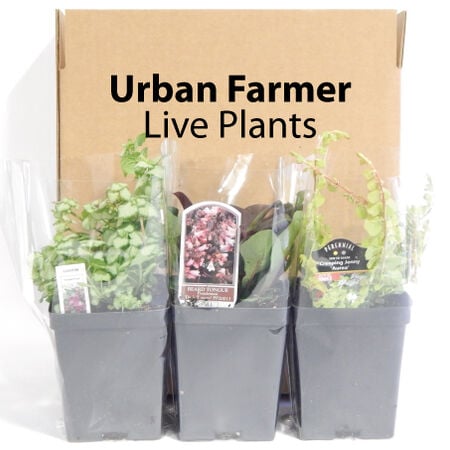Catawba, Grape Plant
Key Attributes
Product Details
Weight
1Depth
3Height
14Width
3Plant Height
4-5'Botanical Name
Vitis labruscaSow Depth
6"Breed
Open-pollinatedSun
Full SunRoot Age
1 Year PlantLife Cycle
PerennialCategories
FruitDays To Maturity (# Days)
730Heirloom
HeirloomComponents
Growing Instructions
![]() Learning Download: How to Grow Grapes
Learning Download: How to Grow Grapes
Gardeners don’t have to live in a vineyard to grow grapes, as grapes can grow in nearly any region throughout the United States.
Before Planting: Prior to planting, soak the roots in water for two to three hours.
Planting: Grapes should be planted in the early spring, when they are dormant. Space roots 6 to 10 feet apart and plant them 12 inches deep. Cover the roots with 6 inches of soil and firmly tamp it down. Fill the remaining space with 6 inches of soil that is loosely settled and not tamped down.
Watering: Wait until the soils is totally dry before watering and allow to dry thoroughly before you water again. Plants need less water in the winter.
Fertilizer: Grapes don’t require fertilizer in their first year, but in the second year, feed grapes lightly with a nitrogen fertilizer.
Days to Maturity: Grapes are ripe in the late summer or early fall when they are rich in color, easily crushed but not shriveled, plump and juicy.
Harvesting: To harvest, snip clusters of ripe grapes from the vine. Grapes should be tightly attached to their stem. Pick the grapes on a sunny day, which is when they will have the highest sugar content.
Tips: Some type of support, like a trellis, is needed to grow grapes. To keep birds and other animals away, arrange mesh netting over the vines.
Shipping Schedule
Grape plants will ship at the appropriate time for your planting zone. The chart below estimates when your grape plants will arrive. You will receive an email notifying you when your strawberry roots ship giving you a few days to prepare for planting.
This item’s size, weight, or shape may require an additional shipping surcharge based on the shipping location selected. Specific charges will be displayed during checkout. We are unable to take specific shipping dates at this time.
*This product is perishable and does not ship outside the United States.
|
 |
Our Seed Promise
 "Agriculture and seeds" provide the basis upon which our lives depend. We must protect this foundation as a safe and genetically stable source for future generations. For the benefit of all farmers, gardeners and consumers who want an alternative, we pledge that we do not knowingly buy or sell genetically engineered seeds or plants.
"Agriculture and seeds" provide the basis upon which our lives depend. We must protect this foundation as a safe and genetically stable source for future generations. For the benefit of all farmers, gardeners and consumers who want an alternative, we pledge that we do not knowingly buy or sell genetically engineered seeds or plants.
The mechanical transfer of genetic material outside of natural reproductive methods and between genera, families or kingdoms, poses great biological risks as well as economic, political, and cultural threats. We feel that genetically engineered varieties have been insufficiently tested prior to public release. More research and testing is necessary to further assess the potential risks of genetically engineered seeds. Further, we wish to support agricultural progress that leads to healthier soils, to genetically diverse agricultural ecosystems, and ultimately to healthy people and communities.
To learn more about the "Safe Seed Pledge" please visit www.councilforresponsiblegenetics.org.
Key Attributes
Product Details
Weight
1Depth
3Height
14Width
3Plant Height
4-5'Botanical Name
Vitis labruscaSow Depth
6"Breed
Open-pollinatedSun
Full SunRoot Age
1 Year PlantLife Cycle
PerennialCategories
FruitDays To Maturity (# Days)
730Heirloom
HeirloomComponents
Growing Instructions
![]() Learning Download: How to Grow Grapes
Learning Download: How to Grow Grapes
Gardeners don’t have to live in a vineyard to grow grapes, as grapes can grow in nearly any region throughout the United States.
Before Planting: Prior to planting, soak the roots in water for two to three hours.
Planting: Grapes should be planted in the early spring, when they are dormant. Space roots 6 to 10 feet apart and plant them 12 inches deep. Cover the roots with 6 inches of soil and firmly tamp it down. Fill the remaining space with 6 inches of soil that is loosely settled and not tamped down.
Watering: Wait until the soils is totally dry before watering and allow to dry thoroughly before you water again. Plants need less water in the winter.
Fertilizer: Grapes don’t require fertilizer in their first year, but in the second year, feed grapes lightly with a nitrogen fertilizer.
Days to Maturity: Grapes are ripe in the late summer or early fall when they are rich in color, easily crushed but not shriveled, plump and juicy.
Harvesting: To harvest, snip clusters of ripe grapes from the vine. Grapes should be tightly attached to their stem. Pick the grapes on a sunny day, which is when they will have the highest sugar content.
Tips: Some type of support, like a trellis, is needed to grow grapes. To keep birds and other animals away, arrange mesh netting over the vines.
Shipping Schedule
Grape plants will ship at the appropriate time for your planting zone. The chart below estimates when your grape plants will arrive. You will receive an email notifying you when your strawberry roots ship giving you a few days to prepare for planting.
This item’s size, weight, or shape may require an additional shipping surcharge based on the shipping location selected. Specific charges will be displayed during checkout. We are unable to take specific shipping dates at this time.
*This product is perishable and does not ship outside the United States.
|
 |
Our Seed Promise
 "Agriculture and seeds" provide the basis upon which our lives depend. We must protect this foundation as a safe and genetically stable source for future generations. For the benefit of all farmers, gardeners and consumers who want an alternative, we pledge that we do not knowingly buy or sell genetically engineered seeds or plants.
"Agriculture and seeds" provide the basis upon which our lives depend. We must protect this foundation as a safe and genetically stable source for future generations. For the benefit of all farmers, gardeners and consumers who want an alternative, we pledge that we do not knowingly buy or sell genetically engineered seeds or plants.
The mechanical transfer of genetic material outside of natural reproductive methods and between genera, families or kingdoms, poses great biological risks as well as economic, political, and cultural threats. We feel that genetically engineered varieties have been insufficiently tested prior to public release. More research and testing is necessary to further assess the potential risks of genetically engineered seeds. Further, we wish to support agricultural progress that leads to healthier soils, to genetically diverse agricultural ecosystems, and ultimately to healthy people and communities.
To learn more about the "Safe Seed Pledge" please visit www.councilforresponsiblegenetics.org.






